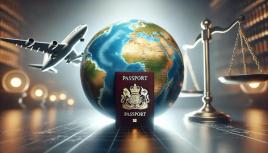Blog • Published on:January 23, 2025 | Updated on:February 12, 2025 • 27 Min
Dual Citizenship Countries: Complete List and Requirements
Dual citizenship is a truly valuable asset, and many people today go for it, because of clear advantages. This legal status, which grants individuals citizenship in two countries simultaneously, opens doors to increased global mobility, expanded business opportunities, and a better quality of life. Starting a journey toward dual citizenship can lead to exciting new ways of living, working, and exploring the world.
With so much to discuss about this topic, this guide serves as a clear and engaging resource for anyone interested in obtaining a second passport or holding multiple citizenships in 2025.
Whether you’re considering citizenship by investment or exploring naturalization possibilities, this article details the countries, requirements, and practical steps involved in the process. Below is a list of countries that allow dual citizenship.
What is Dual Citizenship
Having dual citizenship means holding the legal status of a citizen in two different countries at the same time. With this status, you are entitled to all the rights, privileges, and responsibilities under each nation’s constitution.
This arrangement allows you to benefit from the advantages both countries offer, such as access to healthcare, education, and social services, while also obligating you to abide by their respective laws and regulations. Dual citizenship is more than just a legal classification; it is a strategic asset that can pave the way for diverse personal and professional opportunities across borders.
Benefits of Having Multiple Citizenships
Holding two passports can enrich your life in various meaningful ways, including but not limited to:
- Increased Global Mobility: Dual citizenship often facilitates easier travel between countries, reducing visa hassles and streamlining border crossings.
- Expanded Business Prospects: Enjoy enhanced market access, investment opportunities, and the ability to operate businesses in two distinct legal environments.
- Improved Quality of Life: Benefit from the social services, healthcare systems, and educational opportunities available in both countries.
- Enhanced Personal Security: In times of political or economic instability, having a second citizenship can provide a reliable alternative residence.
- Cultural Enrichment: Experience and integrate into two different cultures, enriching your personal worldview and intercultural communication skills.
- Economic Advantages: Access to favourable taxation systems, banking facilities, and potential economic incentives in each nation can offer significant financial benefits.
Common Misconceptions About Dual Citizenship
Several myths surround the concept of dual citizenship, often leading to confusion and hesitation. Here are some common misconceptions and the realities behind them:
Double Taxation
Misconception: Dual citizens automatically face taxation in both countries.
Reality: Many countries have tax treaties and exclusions that help avoid double taxation. It’s essential to understand the tax policies of both nations to manage this effectively.
Complex Legal Entanglements
Misconception: Dual citizenship invariably leads to complicated legal issues and conflicting obligations.
Reality: While there are indeed additional legal nuances, most dual citizens find that laws can be navigated with the right guidance and careful planning.
Loss of National Loyalty
Misconception: Accepting a second citizenship means abandoning your original country.
Reality: Dual citizenship typically permits you to retain all the rights and responsibilities of your initial nationality, ensuring that you continue to benefit from your original country’s protections and privileges.
Limited Recognition
Misconception: Dual citizenship is not widely accepted or respected internationally.
Reality: Many countries acknowledge and support dual citizenship, understanding that it can contribute to stronger international ties and more robust global connections.
Detailed Overview of Countries That Allow Dual Citizenship
Countries around the globe adopt varied approaches to dual citizenship, reflecting their unique legal frameworks, cultural values, and strategic priorities. These nations not only simplify international mobility but also provide additional avenues for cultural exchange, economic growth, and personal security.
European Countries
Europe has embraced dual citizenship as a way to attract global talent and maintain strong ties with diasporic communities. Many European countries recognize the benefits of allowing citizens to hold more than one nationality—a reflection of the region’s commitment to integration, cultural diversity, and global mobility.
Ireland
Ireland is very supportive of dual citizenship, particularly benefiting those with Irish ancestry. It offers a simple naturalization process that strengthens ties with its global diaspora and reinforces the country's inclusive cultural identity.
France
France permits dual citizenship without requiring individuals to renounce their previous nationality. Its policies combine modern immigration strategies with a deep cultural commitment to embracing diverse backgrounds, making it popular choice for individuals from many different parts of the world.
Italy
Italy maintains robust practices for claiming citizenship by descent, making it highly appealing for individuals with Italian heritage. In addition to citizenship by descent, Italy also offers naturalization options for long-term residents, thereby extending its benefits to a broader range of applicants.
Portugal
Portugal has evolved its policies to attract both investment and skilled professionals. In addition to traditional naturalization, it offers citizenship through investment programs that also contribute to local economic growth, providing an attractive dual pathway for those seeking EU residency. If you are considering moving and living in Portugal, you might find this article Living in Portugal: Expat Guide helpful.
Spain
Generally, Spain does not permit dual citizenship with another country other than with Iberian countries. If you obtain Spanish citizenship, you will have to renounce your original nationality. There are exceptions, including Spanish-American countries, Andorra, the Philippines, Equatorial Guinea or Portugal.
Sweden and Switzerland
Both Sweden and Switzerland take a liberal stance by generally allowing dual citizenship. Their policies enable diverse communities to contribute fully to society without forcing a choice between national identities, thus fostering an environment of inclusivity and mutual benefit.
Germany
Traditionally, Germany required renunciation of previous nationalities. However, recent reforms and exceptions, especially for EU citizens, indicate a gradual shift toward accommodating dual citizenship, provided that key legal and social criteria are met. This change reflects Germany's evolving approach in a globalized world.
Caribbean Nations
Many Caribbean nations offer streamlined citizenship programs that favor dual status, primarily through well-regulated investment schemes and straightforward naturalization processes. These policies not only stimulate local economies but also reinforce the region’s reputation as a vibrant, welcoming community.
St. Kitts and Nevis
St. Kitts and Nevis is one of the pioneers in citizenship by investment programs, offering a clear path to a second passport in exchange for qualifying investments. Its options include a donation or real estate investment, combined with quick processing times and extensive visa-free travel benefits.
Antigua and Barbuda
Antigua and Barbuda has a great program where applicants gain access to extensive travel benefits and a favorable tax environment. This makes it a popular choice for individuals seeking to diversify their nationality portfolio through a well-regulated investment approach.
Dominica
Dominica’s citizenship by investment program is celebrated for its affordability and efficient processing times. The program is designed to be accessible while delivering the benefits of an additional passport, making it attractive to a broad range of investors.
Grenada
Grenada combines the benefits of dual citizenship with unique privileges, such as visa-free access to regions like China. These advantages add significant value for global travelers and business professionals, while the program also fosters economic incentives for entrepreneurs and investors interested in dynamic Caribbean markets.
In essence, the Caribbean approach to dual citizenship underscores a commitment to openness and economic development. By offering clear, attractive paths to a second nationality, these nations not only enhance their international appeal but also contribute to stronger regional ties and a more interconnected global community.
North American Countries
North America presents a diverse landscape when it comes to dual citizenship, with policies that reflect each country's distinct history, culture, and immigration priorities.
Canada
Canada is widely recognized for its welcoming approach to dual citizenship. Through a process that emphasizes permanent residency followed by naturalization, without requiring naturalized citizens to renounce their previous passports, Canada has built a vibrant multicultural society. This system makes the country highly attractive to skilled immigrants and investors, who benefit from comprehensive social services while maintaining ties to their countries of origin.
United States
The United States permits dual citizenship via naturalization or by obtaining citizenship through descent from U.S. citizens abroad. Although the U.S. does not actively encourage dual nationality, its legal framework allows for a blend of identities. Prospective dual citizens, however, must navigate responsibilities such as tax obligations and, in certain cases, considerations related to national service, highlighting the importance of legal guidance throughout the process.
Mexico
Mexico offers a unique perspective by allowing its citizens to acquire another nationality without the need to renounce Mexican citizenship. This flexible policy benefits those with strong cultural ties and economic interests, particularly given Mexico’s strategic role as a bridge between North and Central America. Naturalization in Mexico is typically accessible for residents with long-term connections and for individuals with familial links, offering clear pathways to dual citizenship.
Each of these North American examples illustrates the wide variety of pathways available for those seeking multiple citizenships. Whether through investment and naturalization in Canada, navigating the layered process in the United States, or utilizing Mexico's flexible policies, these approaches support a growing demand for international mobility and cultural exchange.
Asia-Pacific Countries
Historically, many countries in the Asia-Pacific region maintained strict policies that discouraged the possession of multiple nationalities. However, evolving global trends and an increasing need for international collaboration have prompted several nations to adapt their rules, with a particular focus on maintaining diaspora connections and attracting skilled professionals.
New Zealand
New Zealand offers pathways for both long-term residents and individuals with ancestral connections to obtain citizenship. Its policy generally supports dual nationality, enabling individuals to benefit from New Zealand’s robust social system and stable economy while retaining another passport. This openness has contributed to a multicultural society that values both its historical traditions and modern contributions.
The Philippines
In the Philippines, dual citizenship is permitted for natural-born citizens who acquire a new nationality while maintaining a legal connection with their home country. This approach is especially appealing to overseas workers and expatriates, as it allows them to participate actively in the social and political processes of their homeland, fostering a lasting sense of belonging.
Australia
Australia allows dual citizenship without stringent conditions on renouncing prior nationalities. Australian citizens enjoy comprehensive social security benefits and healthcare services, and the policy also facilitates participation in international business and cultural exchanges. This strategy supports the nation’s vision of a vibrant, globally connected community.
Japan and South Korea
In contrast, Japan and South Korea have traditionally enforced restrictive policies that require individuals to choose a single nationality upon reaching adulthood. This approach underscores a cultural emphasis on national unity and identity. However, there is growing discussion and incremental policy adjustments aimed at addressing the needs of a more mobile and globally engaged population.
Overall, the Asia-Pacific region is navigating a balance between preserving its unique cultural and legal traditions and embracing the benefits of a globalized world. This gradual evolution in citizenship policies reflects broader recognition of the diverse needs of modern citizens, offering varied pathways to dual nationality while addressing local priorities in governance and social cohesion.
Countries That Don't Allow Dual Citizenship
Not every nation permits holding a second passport, and understanding these restrictions is crucial for anyone considering international mobility. Some countries have maintained strict single citizenship policies due to concerns related to national identity, security, or cultural values. These policies are often rooted in historical contexts or political strategies designed to preserve social cohesion and ensure a unified national allegiance.
Notable Countries with Single Citizenship Policies
China
China enforces a strict single citizenship rule. Under Chinese law, acquiring another nationality automatically results in the loss of Chinese citizenship. This stance is tied to national security concerns and the government's emphasis on maintaining a unified national identity. The policy reflects historical priorities where loyalty and control over the citizenry are paramount.
India
Although India does not formally allow dual citizenship, it offers a type of visa known as the Overseas Citizenship of India (OCI) for people of Indian descent. However, this status does not confer full citizenship rights. India's policy is grounded in the desire to keep a cohesive national identity and manage the complexities arising from the large and diverse Indian diaspora.
Japan
Japan has historically discouraged dual citizenship, requiring its citizens to choose a single nationality upon reaching adulthood. The Japanese approach stems from cultural and legal traditions that emphasize singular national loyalty. In recent years, while the rules remain strict, there has been some public debate regarding potential reforms to better reflect the modern globalized world.
South Korea
South Korea generally favors single citizenship, especially for individuals who acquire another nationality as adults. The government has maintained this policy to promote national unity and prevent conflicts in legal obligations. Exceptions have been made in cases where special circumstances apply, but the overarching legal framework strongly prefers one consistent national allegiance.
Saudi Arabia
Saudi Arabia upholds a stringent policy against dual citizenship, reflecting broader concerns about national security and social stability. The country views dual nationality as a potential source of divided loyalties and thus requires individuals seeking Saudi citizenship to fully commit to it, often necessitating the renunciation of any previous citizenship.
United Arab Emirates (UAE)
The UAE’s approach to citizenship is highly selective, with no provisions for dual citizenship in most cases. The policy is designed to maintain a clear national identity and tight control over its citizenry in a region where political and tribal affiliations play a significant role. That said, the UAE still offers many advantages, including favorable taxation, robust banking options, and high living standards, which continue to attract many people. For more details on how to obtain a UAE passport, read here.
These countries underscore the complex balance between maintaining a unified national identity and engaging with the increasingly interconnected global community. The strict single citizenship policies in these nations are often driven by longstanding cultural, political, and security concerns.
For those considering options abroad, it is essential to be fully informed about these restrictions, as they can significantly influence personal and professional plans.
Exceptions and Special Cases
Even in countries that generally enforce single citizenship policies, there are notable exceptions that allow for alternate pathways under certain circumstances. These exceptions often arise from factors like heritage connections, diplomatic needs, or evolving legislative frameworks that recognize the complexities of modern global mobility.
Heritage-Based Exceptions
Some countries make exceptions for individuals who can demonstrate strong ancestral ties to the nation. For example, in Germany, while the standard practice requires renouncing previous citizenships, individuals of German descent who are born abroad may be granted citizenship without automatically losing their original nationality. Similarly, Poland offers citizenship by descent, which provides a route to dual citizenship in practice, even if the legal framework suggests otherwise.
Diplomatic and Special Status Cases
Certain nations temporarily allow dual citizenship for diplomats or government officials involved in international negotiations and collaborations. For instance, while South Korea generally requires citizens to choose one nationality upon reaching adulthood, there are special provisions under which individuals working in key diplomatic roles might retain dual status to facilitate international cooperation.
Legislative Reforms and Pilot Programs
In response to changing global dynamics, some countries with traditionally strict policies are piloting reforms that allow for dual citizenship on a case-by-case basis. For instance, Japan has seen growing discussion about easing its strict dual-citizenship rules. While the official stance remains rigorous, legislative debates indicate potential future exceptions for those with long-term expatriate ties or significant contributions to Japanese society abroad.
Economic and Investment Exceptions
In rare cases, countries may offer dual citizenship opportunities to attract high-net-worth individuals through structured investment schemes. Although this is more common in regions like the Caribbean, some European and Asian countries are exploring similar strategies. These pilot programs are designed to provide economic benefits to the nation while offering a pathway to dual citizenship for investors who meet stringent financial criteria.
How to Obtain Dual Citizenship
The process to obtain dual citizenship encompasses multiple strategies, each tailored to different backgrounds and goals. Depending on your circumstances, the ideal route might involve investment, establishing residency, leveraging family ties, or even entering a marital union. Below is a detailed look at various methods:
Citizenship by Investment Programs (CBI)
Many countries have established Citizenship by Investment (CBI) schemes that provide an expedited pathway to a second passport through qualifying financial contributions. For example, St. Kitts and Nevis Citizenship Program, offers applicants the chance to secure citizenship by making a significant donation to a government fund or investing in approved real estate projects. Accelerates the process, providing access to lucrative visa-free travel options and attractive tax benefits.
Or Cyprus Residency by Investment Program. Though subject to evolving regulations, the program has provided citizenship in exchange for large-scale investments, accompanied by stringent due diligence and clear financial criteria.
These programs not only accelerate the acquisition of a second passport but also offer additional financial and travel perks, making them popular among investors looking to diversify their nationality portfolio.
Citizenship by Naturalization
Naturalization remains one of the most common pathways to obtain dual citizenship. This process typically involves meeting several key criteria:
- Residency Prerequisites: Applicants must reside in the country for a specified number of years.
- Language Proficiency: Demonstrated competence in the local language, often verified through standardized tests.
- Cultural and Legal Familiarity: A good understanding of the country's culture, legal systems, and societal values.
For instance, Portugal requires a specified period of residency. Applicants must pass a language test and, in some cases, a citizenship test. Or Canada, mandates permanent residency followed by a set period of living in the country. Requires a passing score on a citizenship exam covering Canadian history and government.
These naturalization routes ensure that new citizens establish a genuine connection with their adopted country while upholding the legal and cultural standards expected of residents.
Marriage-Based Dual Citizenship
Marriage to a citizen of another country can offer an alternative and often simplified path to dual citizenship. This pathway typically features Accelerated or Modified Naturalization Processes.
Many nations provide expedited procedures for spouses of citizens. For example, in Brazil, foreign spouses can apply to apply for citizenship after a relatively short period of residence. It is required that the marriage is genuine and legally recognized. Or France, allows a foreign spouse to pursue citizenship after living in the country for a designated period.
While these processes are generally more accessible, they still require thorough legal verification and complete documentation to confirm the legitimacy of the marital relationship.
Ancestry and Descent Options
Obtaining citizenship through ancestry or descent is particularly appealing for individuals with family ties abroad. Many countries allow citizens to pass their nationality to their children, sometimes extending eligibility to grandchildren and beyond. Key aspects include:
- Documentation of Heritage: Applicants must provide documented evidence of their lineage and ancestral links.
- Retention of Cultural Identity: This method not only reconnects individuals with their heritage but also offers practical benefits such as access to regional passports.
These ancestry and descent routes emphasize the importance of historical and legal documentation, ensuring that those with legitimate family connections can reclaim or obtain citizenship without the need for long-term residency.
Overview of Pathways to Dual Citizenship
Requirements for Dual Citizenship
Each pathway to dual citizenship is governed by unique sets of criteria, documentation, and financial or time commitments. Understanding these requirements is crucial in preparing your application effectively. Below is a comprehensive breakdown of the key components:
General Eligibility Criteria
- Residency Period: A mandatory period during which you must have resided in the country. Duration varies by country, ranging from a few years to over a decade.
- Language Proficiency: Evidence of your language skills is typically required. This can be demonstrated through standardized tests or certifications accepted by the relevant immigration authorities.
- Proof of Integration: You must show demonstrable connections to the community. This might include evidence of employment, educational achievements, or active cultural involvement that underscores your integration into local society.
- Personal Background: A clean criminal record and stable personal circumstances are essential.
In some cases, factors such as age and financial stability may also be considered to ensure that the candidate is well-prepared to assume citizenship responsibilities.
Documentation and Paperwork
A complete and well-organized set of documents is key to a successful application:
- Identification Documents: Valid, government-issued identification such as a passport or national ID card.
- Birth Certificates: Official copies of your birth certificate, along with any necessary translations.
- Proof of Residency: Documents such as utility bills, rental agreements, employment records, or tax returns that confirm your residence in the country.
- Additional Legal Documents: Depending on your personal situation, you may need to provide marriage certificates, divorce decrees, or adoption records.
- Language Certification: Certificates or test results that verify your proficiency in the country's primary language.
- Expert Verification: Consulting a legal expert or immigration advisor can help ensure all documentation is correct and complete, reducing the risk of delays or rejection.
Investment Requirements
For citizenship by investment programs, financial contributions play a central role:
- Monetary Contributions: A predetermined investment amount, often required to be donated to a government fund or invested in specific projects such as real estate, business ventures, or government bonds.
- Financial Records: Detailed financial documentation confirming the source and legitimacy of your investment funds. This may include bank statements and audit reports.
- Processing Fees: Additional fees for due diligence, application processing, and administrative services are typically required.
- Investment Options: Each program outlines the acceptable forms of investment. These options are often designed to stimulate the local economy and include a range of acceptable financial instruments.
Residency Requirements
To establish a genuine connection with the host country, many citizenship processes mandate a residency period:
- Duration of Stay: A specified minimum number of years that you must reside in the country. The required period varies by country and the specific citizenship program.
- Continuous Presence: Evidence of an uninterrupted stay, verified through records such as employment history, educational enrollment, or residential leases.
- Cultural Integration: Proof of engagement with the local culture and community, which may be demonstrated through local memberships, volunteer work, or participation in community activities.
- Legal and Tax Compliance: Documentation proving adherence to local laws, including timely tax filings and participation in civic duties, thereby reinforcing your established connection to the community.
Popular Dual Citizenship Programs
Several programs have gained attention because of their clear guidelines, attractive benefits, and accessible routes to acquiring a second passport. Here’s an in-depth look at a few standout options:
Malta Citizenship by Investment
Malta’s citizenship program is recognized for its strong due diligence and commitment to community integration. For investors, Malta offers a mixed investment option with the following highlights:
- Minimum Investment: A combined option starting at €680,000, which may include a donation to a government fund, investments in real estate, or approved financial instruments.
- Time to Citizenship: Typically ranges from 12 to 36 months, influenced by individual circumstances and the investment route chosen.
- Visa-Free Access: Passport holders gain access to over 160 countries and territories, making it an appealing option for those seeking extensive global mobility.
In addition to these practical benefits, Malta’s program allows investors to enjoy full EU citizenship rights. This includes the freedom to live, work, and study in any EU member state, making it a valuable asset for both personal and professional growth.
St. Kitts and Nevis Citizenship Program
The St. Kitts and Nevis program continues to be popular, largely due to its affordability and relatively short processing time. The program offers multiple investment avenues:
- Donation Option: A minimum contribution of $250,000 to the Sustainable Growth Fund.
- Real Estate Option: An alternative investment of at least $325,000 in government-approved properties.
- Time to Citizenship: The streamlined process generally concludes in 6 to 8 months.
- Visa-Free Access: Beneficiaries enjoy visa-free or visa-on-arrival travel to over 150 countries and territories.
These aspects make the St. Kitts and Nevis program especially attractive for investors seeking an efficient and cost-effective way to enhance their international mobility and secure additional safety through a secondary passport.
Portugal Golden Visa
Portugal’s Golden Visa program provides an attractive pathway to residency — and eventually citizenship — while offering many benefits linked with EU membership. The key features include:
- Investment Requirement: A minimum of €500,000 into an approved investment fund. Alternatives may include real estate or capital transfer options.
- Time to Residency: Applicants can typically secure residency within 6 to 12 months, with relatively low physical presence requirements.
- Visa-Free Access: The visa grants access to the Schengen Area, enabling hassle-free travel across 26 European nations.
Beyond these core benefits, the program is praised for its flexibility. It appeals to those who aim to gradually integrate into European life, benefiting from high-quality healthcare, education, and a vibrant economy. Additionally, the eventual pathway to citizenship allows investors and their families to enjoy long-term stability within one of Europe’s most desirable regions.
Turkey Citizenship by Investment Program
Turkey’s citizenship by investment is known for its rapid processing and multiple investment options, catering to a wide array of investors. Highlights of the program include:
- Real Estate Investment: A popular choice with a minimum investment of $400,000, subject to holding requirements that help anchor economic ties.
- Alternative Options: Besides real estate, investors may also explore bank deposits or investments in government bonds based on current regulatory offerings.
- Time to Citizenship: Applicants can expect a relatively swift process, with citizenship granted typically within 6 to 8 months.
- Visa-Free Access: Turkish passport holders enjoy visa-free or visa-on-arrival access to over 120 countries and territories.
Turkey’s program is particularly attractive due to its competitive investment thresholds and strategic regional positioning between Europe and Asia. This offers not only enhanced global mobility but also the chance to tap into an emerging market with vast economic potential.
Citizenship by Investment (CBI) Programs Summary
Navigating Dual Citizenship
Holding dual citizenship offers significant advantages, including travel flexibility, easier visa access, and broader global mobility. However, to leverage this privilege, you must use both passports wisely and in accordance with international regulations.
The key is to maintain consistent and logical travel documentation. Every trip should present a clear and coherent timeline through your entry and exit records, ensuring seamless passage through immigration.
Here’s how you can navigate dual citizenship more effectively.
Passport Selection
Choose which passport to use based on your destination.
For instance, a Syrian–St. Lucian dual citizen can use their St. Lucian passport when flying to European destinations to simplify visa requirements, while relying on their Syrian passport for regional Middle Eastern travel.
Passport Expiration and Renewal
Keep track of your passport expiration dates and renewal requirements.
Let’s say someone holds passports from both Saudi Arabia and Dominica, each with different renewal timelines.
The Saudi passport requires renewal every five years with a mandatory personal appearance, while the Dominican passport can be renewed through consular services, though the process takes longer. In this case, they may plan to renew one passport six months before it expires to ensure that the other remains valid for travel at all times.
Booking and Airport Procedures
Ensure that your passport details match your flight booking and understand the varying requirements at different checkpoints.
For example, a dual Chinese–Portuguese citizen may choose to book flights using their Portuguese passport for visa-free access to the United States. However, as required by law, they should re-enter China using their Chinese passport.
To avoid complications at the borders, it's best to keep track of which passport was used for booking and ensure that all visa and entry requirements align with the corresponding passport details.
Border Crossing Scenarios
Different border-crossing scenarios require different approaches. Land crossings, for example, present unique challenges.
For instance, if a Dominican–Turkish dual citizen is traveling to an EU country, the best approach is to keep their Turkish passport securely stored and use their Dominican passport when driving across EU borders to benefit from visa-free access. This strategy simplifies travel while maintaining consistent immigration records.
Privacy Implications and Risk Management
Modern border control systems increasingly share information internationally, which poses challenges for citizens of countries that prohibit or restrict dual citizenship.
A person holding both Chinese and Portuguese passports must carefully consider privacy implications, as shared biometric data and cross-referenced entry/exit records could potentially reveal their dual citizenship status to authorities in countries with strict policies.
Emergency Situations
Unexpected situations, such as natural disasters, political unrest, or personal emergencies, may require quick decisions regarding which passport to use.
- Emergency Evacuations: A person holding both Lebanese and Cypriot passports benefited from their Cypriot passport during a political crisis in Europe while retaining their Lebanese passport for managing business interests back home.
- Document Discrepancies: If your passports contain name variations due to transliteration or other factors, carrying certified translations and supporting documentation can prevent unnecessary complications.
Transit Considerations
When planning transit through multiple countries, ensure that the passport you use complies with the visa and entry requirements of the transit country.
For example, if you’re flying from Country A to Country B with a layover in Country C, verify the visa policies for Country C based on the passport you intend to use. Taking this step can help prevent last-minute confusion and ensure a smooth transit experience.
Document Organization and Security
Maintaining two passports requires organization and careful handling.
- Secure Storage: Consider using a dual passport holder with separate compartments for each passport.
- Backup Copies: Keep copies of important documents such as visas, travel itineraries, and contact information for your country’s embassy or consulate. Proper organization minimizes the risk of misplacing a passport and ensures you are well-prepared for any security check.
Handling Unexpected Situations
Even the best-laid plans can encounter unforeseen hurdles. If you run into issues at the border, it's always good to remain calm and clearly explain your dual passport status to the immigration officer.
Presenting your passports and supporting documents in an organized manner can help resolve misunderstandings quickly. Additionally, having contact details for your country’s embassy or consulate on hand can expedite assistance if needed.
You can maximize the benefits of dual citizenship and ensure smooth, hassle-free travel if you carefully plan your passport usage, keep track of renewal dates, match your travel documents to destination requirements, and remain mindful of local rules.
Legal Considerations and Obligations
Before pursuing dual citizenship, it is important to understand the legal aspects that accompany this status.
Tax Implications
Holding multiple citizenships can have various tax implications. It is advisable to review both countries' tax codes to avoid unexpected liabilities.
Military Service Requirements
Some nations require citizens to fulfill military service obligations. Applicants must consider how dual citizenship may affect eligibility.
Voting Rights and Responsibilities
Dual citizens might have voting rights in both countries. Participation in elections comes with responsibilities and potential legal expectations.
Choosing Your Path to Dual Citizenship
As you’ve seen, obtaining dual citizenship is possible in many parts of the world, with each country offering unique benefits that align with its cultural, legal, and economic priorities. Whether you’re drawn to the expansive travel opportunities of a second passport, the economic advantages, or the personal security that comes with dual status, the choice of where to go and how to manage the process is highly individual.
For example, one might find that becoming a citizen of one country complements their professional or personal ambitions perfectly, while in another instance, pursuing dual citizenship may require a more nuanced approach due to local regulations or investment requirements.
In all cases, having access to experienced and authorized agents can make a significant difference in navigating complex legal frameworks and ensuring a smooth process. Savory & Partners offers specialized support through a range of services. Our experienced team possesses a detailed understanding of the legal and practical steps involved in acquiring dual citizenship.
With insights into global policies, detailed program reviews, and practical advice, you now have a solid foundation to decide whether pursuing a second passport aligns with your future plans.
FAQ's About Dual Citizenship
What is dual citizenship?
Dual citizenship allows an individual to be a legal citizen of two countries simultaneously, enjoying the rights and privileges of both nations.
What are the main benefits of holding dual citizenship?
Benefits include increased global mobility, improved business opportunities, access to diverse social services, enhanced personal security, and richer cultural experiences.
Can obtaining a second passport affect my tax obligations?
Yes, dual citizenship can have tax implications. It is important to review tax treaties and the tax policies of both countries to avoid double taxation.
Are Citizenship by Investment programs safe?
Most CBI programs are well-regulated with thorough due diligence processes in place, ensuring that applicants meet clear financial and legal criteria while benefiting from expedited citizenship.
What are the typical requirements for naturalization?
Naturalization generally requires a specific residency period, language proficiency, cultural and legal knowledge of the host country, and comprehensive documentation such as identification, proof of residency, and, in some cases, a citizenship test.
References
European Commission. (2022). Dual Citizenship in the European Union: Trends and Policies. Retrieved from https://ec.europa.eu/
Global Citizen Solutions. (2020). Citizenship by Investment Programs: A Comparative Study. Retrieved from https://globalcitizensolutions.com/
International Institute for Migration. (2021). The Impact of Dual Citizenship on Global Mobility. Retrieved from https://www.iom.int/
Ministry of Foreign Affairs of Canada. (2023). Dual Citizenship: Rights and Responsibilities. Retrieved from https://www.international.gc.ca/
Migration Policy Institute. (2022). Global Citizenship and the Future of Dual Nationality. Retrieved from https://www.migrationpolicy.org/
Written By

Laura Weber
Laura Weber is a legal expert in international tax planning and citizenship by investment. With over a decade of experience, Laura helps individuals and families navigate complex legal frameworks to secure dual citizenship and global residency options, particularly in the Caribbean and Europe.
Related Articles









Recently Published









Citizenship enquiry


